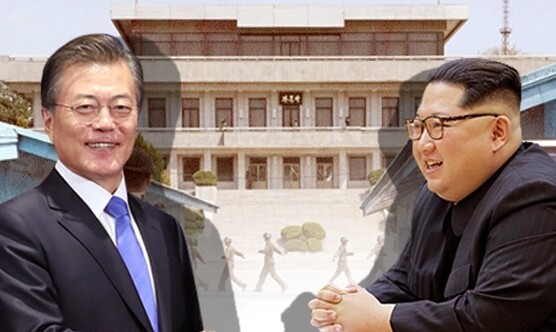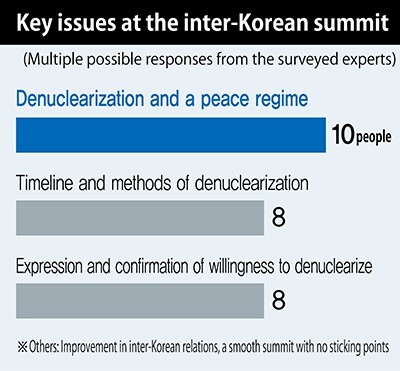hankyoreh
Links to other country sites 다른 나라 사이트 링크
Experts choose “peace” as buzzword for inter-Korean summit

When experts in the areas of inter-Korean relations, foreign policy and security were asked to select a single word that symbolizes the upcoming inter-Korean summit, which could well be one the biggest developments in modern Korean history, their first choice was “peace.”
On Apr. 23 and 24, the Hankyoreh asked experts in the areas of inter-Korean relations, foreign policy and security to provide a keyword symbolizing the inter-Korean summit on their own, rather than selecting one from a list. Of the 30 experts who responded to the questionnaire, 12 (40%) said “peace.” Four (13%) of them chose “denuclearization,” while four others came up with a phrase that combined “denuclearization” and “peace” or “peace regime.” There were also two experts (7%) who selected “guide.” A variety of symbolic terms were chosen by the remaining eight, including “unification,” “anti-war,” “turning point,” “coexistence” and “Panmunjeom.”

This distribution of expert opinions is consistent with the official slogan chosen by the preparatory committee for the inter-Korean summit: “Peace, a new beginning.” But it is notable that experts chose “peace” over “denuclearization” by a ratio of three to one. This clashes with reporting by the domestic and foreign press, which has been overwhelmingly focused on the denuclearization of the Korean Peninsula and on whether North Korean leader Kim Jong-un is committed to denuclearization.
This appears to reflect both the vividness of the experts’ recollection of how close the Korean Peninsula came to war in 2017 and the intensity of their desire for this summit to be an opportunity for moving beyond the hostility and conflict over the past 70 years and toward permanent peace.
The scholars who selected “peace” as their keyword said that this summit needs to be a turning point toward “a Korean Peninsula without the fear or threat of war,” “the establishment of a permanent peace regime,” and “coexistence and prosperity in Northeast Asia.” “Peace” was the choice of experts including Lee Kwan-se, former Vice Minister of Unification (director of the Institute for Far Eastern Studies at Kyungnam University), Koo Kab-woo (University of North Korean Studies), Mun Jang-yeol, (Korea National Defense University), Park Myeong-lim (Yonsei University), Lee Geun (Seoul National University) and Jun Bong-geun (Korean National Diplomatic Academy).
Jin Chang-soo, director of the Sejong Institute; Baek Hak-soon, a senior researcher at the Sejong Institute; Jeong Seong-jang, director of unification strategy research at the Sejong Institute; and Kim Yong-hyun, professor at Dongguk University, said that denuclearization was the key for a successful inter-Korean summit and that it was the “flip side” of a peace regime and improving inter-Korean relations.
Koh Yu-hwan, a professor at Dongguk University, and Shin Beom-chul, a senior researcher at the Asan Institute for Policy Studies, chose both “denuclearization” and a “peace regime” on the grounds that the “denuclearization and the peace process” would have to begin through a “security swap” between South and North Korea during this summit. Wi Seong-rak, former director of South Korea’s office for negotiating peace on the Korean Peninsula, chose “a peace policy that goes hand in hand with denuclearization.”
Kim Yeon-cheol, director of the Korea Institute for National Unification, and Kim Jun-hyeong, a professor at Handong Global University, offered “guide” as their keyword, explaining that during the summit Moon would be able to “set the course for denuclearization and establishing peace on the Korean Peninsula and draw the outline for an agreement in the North Korea-US summit.”
This view suggests that Moon should serve not just as a mediator, but also as a guide.
By Lee Je-hun, editor in chief
Please direct questions or comments to [english@hani.co.kr]

Editorial・opinion
![[Column] A death blow to Korea’s prosecutor politics [Column] A death blow to Korea’s prosecutor politics](https://flexible.img.hani.co.kr/flexible/normal/500/300/imgdb/original/2024/0415/7517131654952438.jpg) [Column] A death blow to Korea’s prosecutor politics
[Column] A death blow to Korea’s prosecutor politics![[Correspondent’s column] The US and the end of Japanese pacifism [Correspondent’s column] The US and the end of Japanese pacifism](https://flexible.img.hani.co.kr/flexible/normal/500/300/imgdb/original/2024/0412/1017129080945463.jpg) [Correspondent’s column] The US and the end of Japanese pacifism
[Correspondent’s column] The US and the end of Japanese pacifism- [Guest essay] How Korea turned its trainee doctors into monsters
- [Guest essay] As someone who helped forge Seoul-Moscow ties, their status today troubles me
- [Editorial] Koreans sent a loud and clear message to Yoon
- [Column] In Korea’s midterm elections, it’s time for accountability
- [Guest essay] At only 26, I’ve seen 4 wars in my home of Gaza
- [Column] Syngman Rhee’s bloody legacy in Jeju
- [Editorial] Yoon addresses nation, but not problems that plague it
- [Column] Can Yoon and Han stomach humble pie?
Most viewed articles
- 1[Guest essay] How Korea turned its trainee doctors into monsters
- 2[News analysis] Watershed augmentation of US-Japan alliance to put Korea’s diplomacy to the test
- 3[Column] A death blow to Korea’s prosecutor politics
- 4[Photo] Cho Kuk and company march on prosecutors’ office for probe into first lady
- 5[Column] A third war mustn’t be allowed
- 6‘National emergency’: Why Korean voters handed 192 seats to opposition parties
- 7Exchange rate, oil prices, inflation: Can Korea overcome an economic triple whammy?
- 8After Iran’s attack, can the US stop Israel from starting a regional war?
- 9[Editorial] New KBS chief is racing to deliver Yoon a pro-administration network
- 10[Editorial] S. Korea should take a note from US-China tactical compromise